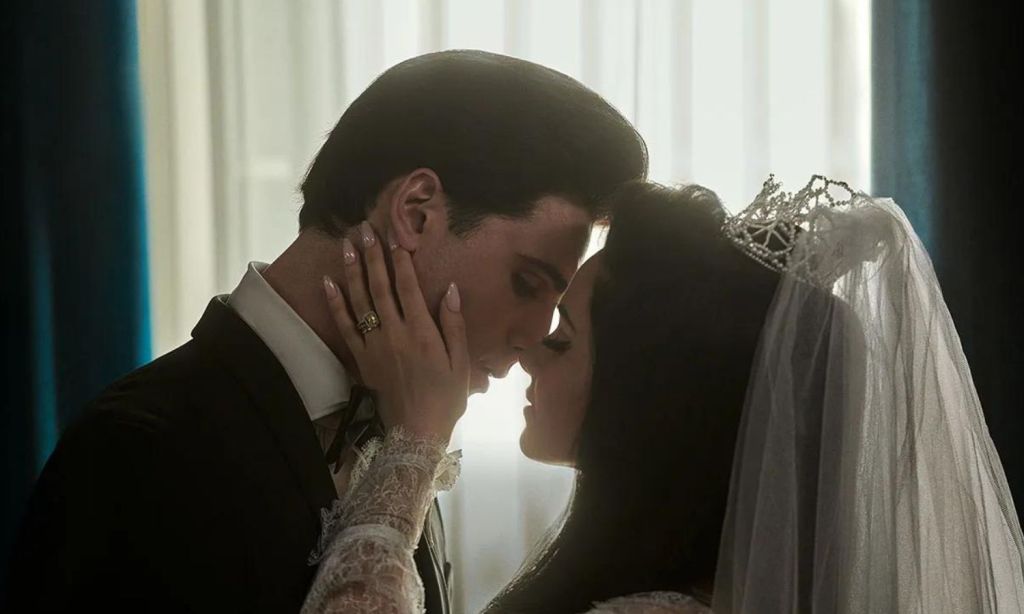In director Sofia Coppola’s new biopic Priscilla, we meet the future Mrs Presley in 1959 when she is a typical 14-year-old all-American schoolgirl, hanging out at a diner and sipping a Coke. She meets the 24-year-old Elvis Presley during his military service and the two begin a wholesome romance of cinema dates and hangouts, despite her parents’ concerns over the age difference.
Over the course of the relationship, we see Priscilla grow from girlhood to womanhood. She moves to Graceland. She graduates from high school. The two get married and have a child.
On the surface, the story of Elvis and his wife Priscilla has all the qualities of a modern fairy tale. The life of an ordinary girl is transformed by a chance encounter with a handsome stranger. She becomes queen to the “King of Rock and Roll” and they live happily ever after in their Memphis palace.
Look deeper, however, and their story wasn’t quite so picture perfect. Coppola’s biopic in fact exposes the dark heart of this fairytale. Graceland emerges as less of a palace and more of a gilded cage where the teenage Priscilla becomes the vulnerable Beauty to Elvis’ increasingly volatile Beast.
Priscilla is the perfect companion piece to Coppola’s 2006 biopic Marie Antoinette. Both films explore the lives of young women who are thrust into the spotlight and must navigate the pressures of their newfound fame amid a suffocating relationship with a powerful man.
The Lens of #MeToo
This is a coming-of-age story. The audience watches as Priscilla matures under the shadow of Elvis’ controlling influence. She is not allowed visitors. He picks her outfits. He tells her to wear makeup. He instructs her to dye her black hair, eerily mimicking his own signature look.
She endures this control while Elvis receives love letters from other women and rumours of his affairs with co-stars circulate in the tabloids, including actress Anne-Margaret and singer Nancy Sinatra. Priscilla is also caught in the throes of Elvis’ spiralling drug addiction and violent outbursts.
Watch: Priscilla Movie Trailer
The #MeToo feminist landscape has shaped the story Coppola tells about Elvis and Priscilla. The Twitter hashtag #MeToo was popularised in 2017 to expose the widespread abuse of women in Hollywood by the film producer Harvey Weinstein. Since then, #MeToo has inspired a broader shift in feminist thinking and art.
Priscilla is the latest in a cycle of post-#MeToo feminist retellings that offer a more sympathetic take on women in the spotlight. The Priscilla biopic is based on the star’s own 1985 memoir Elvis and Me.
In an interview in Entertainment Weekly, Priscilla expresses her respect for Coppola as a feminist filmmaker and describes the film as “right on” in its portrayal of her turbulent marriage. She also supported Coppola’s film as an executive producer.
Power and Abuse
Depicting a much-loved icon with anything other than reverence is bound to provoke criticism. Lisa Marie Presley, the late daughter of Elvis and Priscilla, expressed outrage towards Coppola’s film for making her father out to be “a predator and manipulative”.
The film makes a comment about how powerful men are able to abuse their positions. It offers a valuable reinterpretation of the celebrated “King of Rock and Roll” that speaks to our contemporary moment in which popular entertainers are being held accountable for their actions.
Coppola’s script emphasises the unequal power dynamic between Elvis and Priscilla, including the age difference. The film forces the audience to confront this uncomfortable detail, with numerous references to Priscilla being “a kid” and “just a baby”. Cailee Spaeny convincingly embodies the essence of the young Priscilla, drawn in by Jacob Elordi’s enchanting but sinister Elvis.
This alludes to a wider issue: the lack of care towards women and girls in the entertainment industry. While protesting their teenage daughter’s relationship with an older man, Priscilla’s parents still drive her to parties at Elvis’ house and allow her to stay at Graceland without their supervision.
The film shows how a toxic blend of fame, wealth and status draws people into Elvis’ orbit and, in turn, how his star power allows him to behave in ways that are rarely challenged by those around him.
Priscilla is a brave and poignant biopic that peels back the glittering facade of Elvis and Priscilla’s fairytale. Through Coppola’s feminist storytelling, we see that even the brightest stars cast long shadows.
Want more entertainment news? Click here to read all our content, and check out the stories below:
- Barbenheimer and Beyond: The Best Movies of 2023
- Director Kitty Green Says That on Rewatch, ‘The Royal Hotel’ Is a Comedy
- “The Glam and the Grit”: The Duality of Fame and Power in ‘Paper Dolls’
- Australia at the Cinema: The Best Australian Films of 2023
- “Football, Factories or Prison”: How ONEFOUR Is Shifting Australian Stories
- Politics, Music, and the Depths of the Ocean: The Best Documentaries of 2023
- From ‘Killers of the Flower Moon’ to ‘CODA’: The Best Movies to Stream on Apple
- The Year to Come: The Most Anticipated Movies of 2024
- The Latch Selections: The Best New Movies to Stream
- 31 Must-See Documentaries on Netflix Right Now
- How ‘Anatomy of a Fall’ Reversed French Art Cinema’s Box Office Decline
Looking for something good? Cut through the noise with a carefully curated selection of the latest releases, live events and exhibitions, straight to your inbox every fortnight, on Fridays. Sign up here.
Harriet Fletcher, Lecturer in Media and Communication, Anglia Ruskin University
This article is republished from The Conversation under a Creative Commons license. Read the original article.
Read more stories from The Latch and subscribe to our email newsletter.

